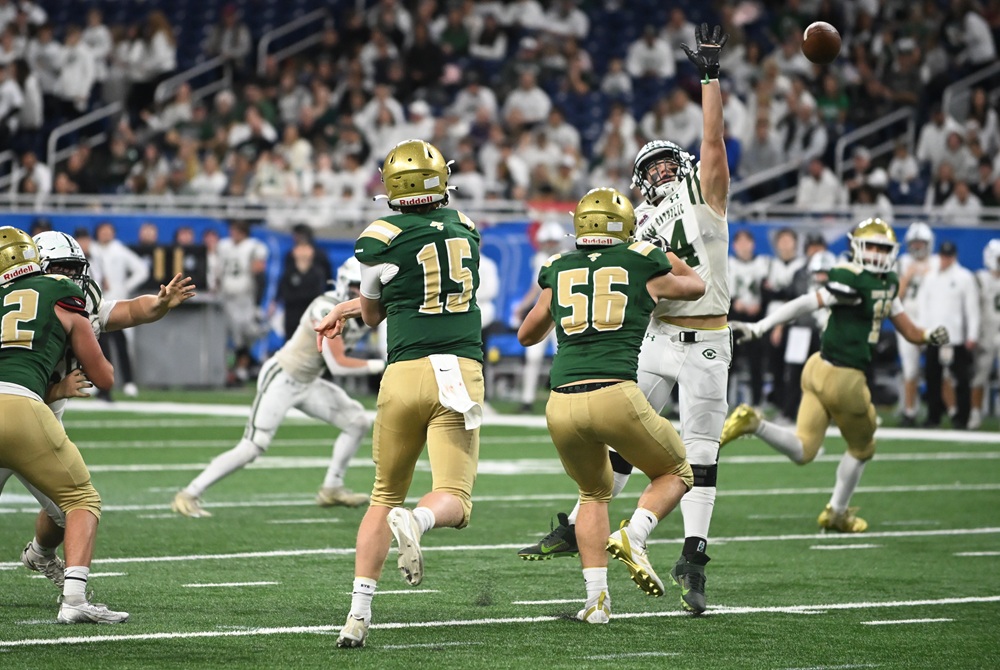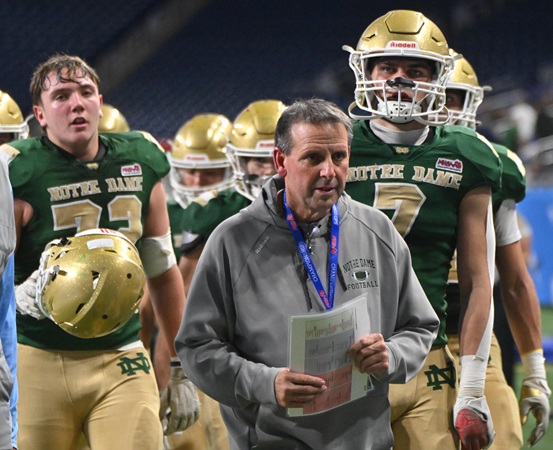
Football’s Future
March 20, 2012
Many folks, including me, will too often focus on the destination more than the trip. More on results than process. The end more than the means.
This is epidemic in sports, on all levels. There’s so much focus on the postseason that it overshadows the regular season.
In contrast, in educational athletics, we are supposed to hold to the principle that opportunities for teaching and learning are as plentiful, maybe more so, in regular season as in tournaments, at subvarsity levels as at varsity, during practices as during games.
This disease affects football as much as any high school sport. There’s been too much focus on the end of the season – playoffs. Postseason tournaments have been the demise of many great Thanksgiving Day high school football classics across the country. Playoffs continue to ruin rivalries and collapse conferences nationwide.
And, disturbingly, the focus on the end of the season misses what is most wrong with football, and may be most threatening to its future. It’s practice. Specifically, what’s allowed during preseason practice and then at practice throughout the season.
We can predict that, in high school football’s future, two-a-day practices will be fewer, practice hours will be shorter and activities will be different. Among proposals we will be presented (and should seriously consider) will be:
If this all sounds silly or radical, remember that the NCAA and NFL are already making such changes. NFL players face contact in practice on only 14 days during a 17-week regular season. Meanwhile, many high school coaches have kids knocking heads and bruising bodies two to four days a week, all season long. Giving critics the impression that interscholastic football for teens is more brutal than the higher levels of football for grown men. Inviting interference from people who think they know better.
Actually, we know better; and we need to do better. Soon.

Notre Dame Prep Seniors Leave Legacy in Leading Irish to Historic Heights
By
Keith Dunlap
Special for MHSAA.com
December 11, 2025
DETROIT – Understandably, Pontiac Notre Dame Prep head football coach Pat Fox couldn’t even get the words out before getting choked up.
 At the start of the postgame press conference following his team’s 42-14 loss to Grand Rapids West Catholic in the Division 5 championship game Nov. 30, Fox tried to introduce several members of a historic senior class.
At the start of the postgame press conference following his team’s 42-14 loss to Grand Rapids West Catholic in the Division 5 championship game Nov. 30, Fox tried to introduce several members of a historic senior class.
Then, the reality set in that he wouldn’t get to coach them again.
“I love my kids, and it’s hard to say goodbye,” Fox said while fighting back tears.
With a Division 5 championship last year and a runner-up finish this fall, Notre Dame Prep has likely established itself as a perennial contender with such a great foundation laid during Fox’s 12 years at the helm.
But to Fox’s point, it certainly will be hard for future players at the school to top the standards set by this year’s senior class.
Notre Dame Prep had never advanced to an MHSAA Final before the last two years and wasn’t a program known for sustained playoff runs.
“They were (32-5) as a group,” Fox said, referring to the team’s combined record the last three years.
What made it even harder for Fox was that he has known those seniors since they were starting kindergarten at the school.
Fox recited a story about how quarterback Sam Stowe, who threw for more than 5,000 yards combined over the last two seasons, took something from his sister during a holiday concert at the school when they were young kids, and Stowe’s sister tried tackling him to get it back.
 Standouts such as linebacker Brody Sink, who has signed with Miami (Ohio), wideout Drake Roa, running back Ben Liparoto, and linemen Henry Ewles and Jack Williams also have been in the building with Fox for seemingly their whole lives and last year helped deliver Fox and the school their first Finals championship.
Standouts such as linebacker Brody Sink, who has signed with Miami (Ohio), wideout Drake Roa, running back Ben Liparoto, and linemen Henry Ewles and Jack Williams also have been in the building with Fox for seemingly their whole lives and last year helped deliver Fox and the school their first Finals championship.
“I’ve known all of them since they were little boys,” Fox said.
Sink said if there was a turning point where the seniors knew they could help take the program to heights never before attained, it came when they were sophomores.
“My sophomore season, we had a great team, a great quarterback and great players,” Sink said. “We ended up losing to a really good Corunna team (in a District Final). But I didn’t hang my head. I knew we’d come back next year. We had a great (senior) class coming back last year and knew it would be something special for the next two seasons. We stayed the course, and it was a very special last two years.”
After going 9-1 two years ago, Notre Dame Prep went 12-1 last fall and 11-3 this season.
Through it all, the group became heroes to younger kids in the school, who regularly came up to them in the halls to say congratulations or just chat.
“It’s pretty cool,” Stowe said. “I used to be that kid too, looking up to all the Notre Dame Prep quarterbacks. To be that guy, you have to appreciate it and I’m totally humbled to be in the spot where I’m at today.”
Fox did say that before the senior class arrived at the varsity level, the program was “knocking on the door for a while” of becoming a state power, citing a close loss in Districts to eventual Division 4 champion Detroit Country Day in 2020 as one example.
Ultimately, it was this senior class that busted through that door, and now Fox hopes those younger players will take the torch and keep the program among the best in the state.
“You would hope they do,” Fox said. “But every year is different and every challenge is great. We have great kids.”
 Keith Dunlap has served in Detroit-area sports media for more than two decades, including as a sportswriter at the Oakland Press from 2001-16 primarily covering high school sports but also college and professional teams. His bylines also have appeared in USA Today, the Washington Post, the Detroit Free Press, the Houston Chronicle and the Boston Globe. He served as the administrator for the Oakland Activities Association’s website from 2017-2020. Contact him at [email protected] with story ideas for Oakland, Macomb and Wayne counties.
Keith Dunlap has served in Detroit-area sports media for more than two decades, including as a sportswriter at the Oakland Press from 2001-16 primarily covering high school sports but also college and professional teams. His bylines also have appeared in USA Today, the Washington Post, the Detroit Free Press, the Houston Chronicle and the Boston Globe. He served as the administrator for the Oakland Activities Association’s website from 2017-2020. Contact him at [email protected] with story ideas for Oakland, Macomb and Wayne counties.
PHOTOS (Top) Pontiac Notre Dame Prep quarterback Sam Stowe (15) throws a pass during the Division 5 Final while protected by lineman Adrian Fernandez (56). (Middle) Fighting Irish coach Pat Fox leads his team – including Henry Ewles (72) and Brody Sink (7) – off the field.

